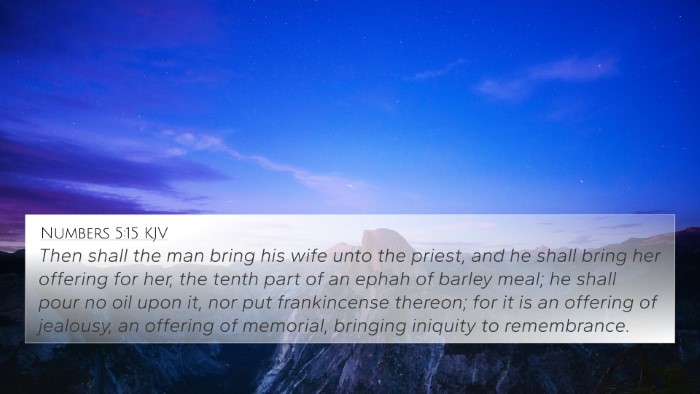Bible Verse Meaning of Numbers 5:25
Numbers 5:25 states: "Then the priest shall take the woman with the offering of jealousy, and he shall have the woman swear with an oath." This verse is situated within a passage concerning the law of jealousy, where the behavior of a suspected adulteress is addressed.
This verse propels several interpretive nuances that underline the spiritual, theological, and social implications inherent in the scriptural text. Drawing insights from public domain commentaries, we can organize the meaning and implications of this verse as follows:
Understanding the Context
To fully grasp the significance of Numbers 5:25, it is essential to consider its broader context within the Book of Numbers and the laws pertaining to jealousy manifestations.
- Jurisdiction of the Priest: The priest plays a pivotal role in administering the law concerning suspected unfaithfulness, emphasizing the gravity of sin and the structured approach of Mosaic Law.
- The Woman's Oath: The act of swearing an oath signifies a solemn covenant with God, underscoring her determination to affirm her fidelity.
Theological Insights
The verse encapsulates significant theological constructs, especially concerning sin, community accountability, and the sanctity of marriage.
- Sin and Accountability: This passage reflects God's desire for fidelity and truth within human relationships, illustrating the divine concern for moral purity.
- The Role of Oaths: The use of oaths in biblical settings aligns with God’s nature as a truthful witness, highlighting the importance of honesty within human affairs.
Comparative Bible Verse Analysis
Numerous other scriptures help to elucidate the themes present in Numbers 5:25 through cross-referencing biblical texts and exploring inter-Biblical dialogue. Here are some pertinent verses:
- Exodus 20:14: "You shall not commit adultery." - This foundational commandment emphasizes the moral expectation surrounding marital relationships.
- Leviticus 20:10: "If a man commits adultery with the wife of his neighbor..." - Both verses highlight the grave consequences and legal ramifications of infidelity.
- Proverbs 6:32: "He who commits adultery lacks sense..." - A reflection on the foolishness associated with unfaithfulness.
- Matthew 5:27-28: Jesus expands the understanding of adultery to include lustful thoughts, thus deepening the moral implications.
- Romans 2:15: "They show that the work of the law is written on their hearts..." - Indicative of inherent moral law present in every human conscience.
- James 5:12: "...but let your yes be yes and your no, no..." - Commanding honesty and integrity in speech and commitments.
- 1 Corinthians 6:18: "Flee from sexual immorality..." - Urges believers to uphold sexual purity in line with God’s standards.
Practical Applications
The implications of Numbers 5:25 extend beyond mere legalism; they serve as applicable truths for contemporary believers striving for holiness.
- Commitment to Integrity: Engaging in personal vigilance against temptation, echoing the necessity of maintaining faithfulness in all interactions.
- Communication in Relationships: Encouraging transparency and honesty in marital relationships, reflecting the biblical model for dealing with suspicions constructively.
Cross-Referencing Bible Study
Engaging in cross-referencing Bible study can enrich one's understanding of Numbers 5:25. Tools for Bible cross-referencing, such as a bible concordance, can illuminate connections between scriptures.
- Cross-reference Bible study encourages an examination of parallels and textual relationships.
- Exploring the details of thematic Bible verse connections reveals a network of thoughts and commands that intermingle throughout the biblical narrative.
Conclusion
Numbers 5:25 poses profound questions regarding faithfulness, accountability, and community dynamics under divine law. As believers delve into its meaning, they uncover not only the historical and cultural contexts but also the timeless principles that govern human relationships. By employing tools and methods of cross-referencing, one can derive a fuller understanding of the entire counsel of Scripture.
This verse encourages one to explore deeper into the connections between Bible verses, linking biblical scriptures effectively while studying God's perspective on faithfulness and sin.






